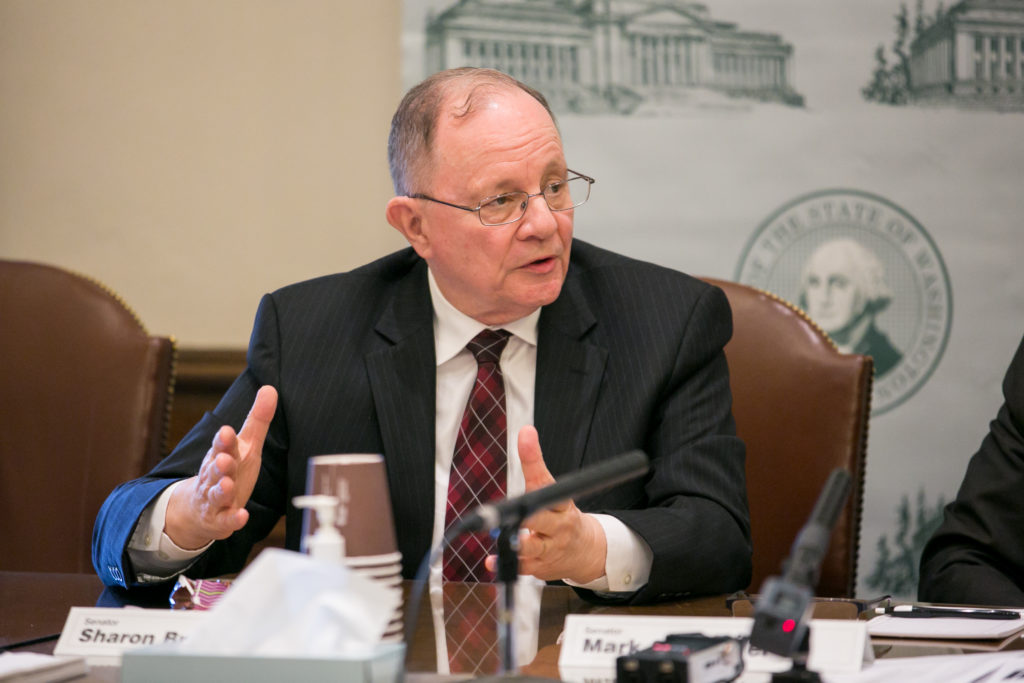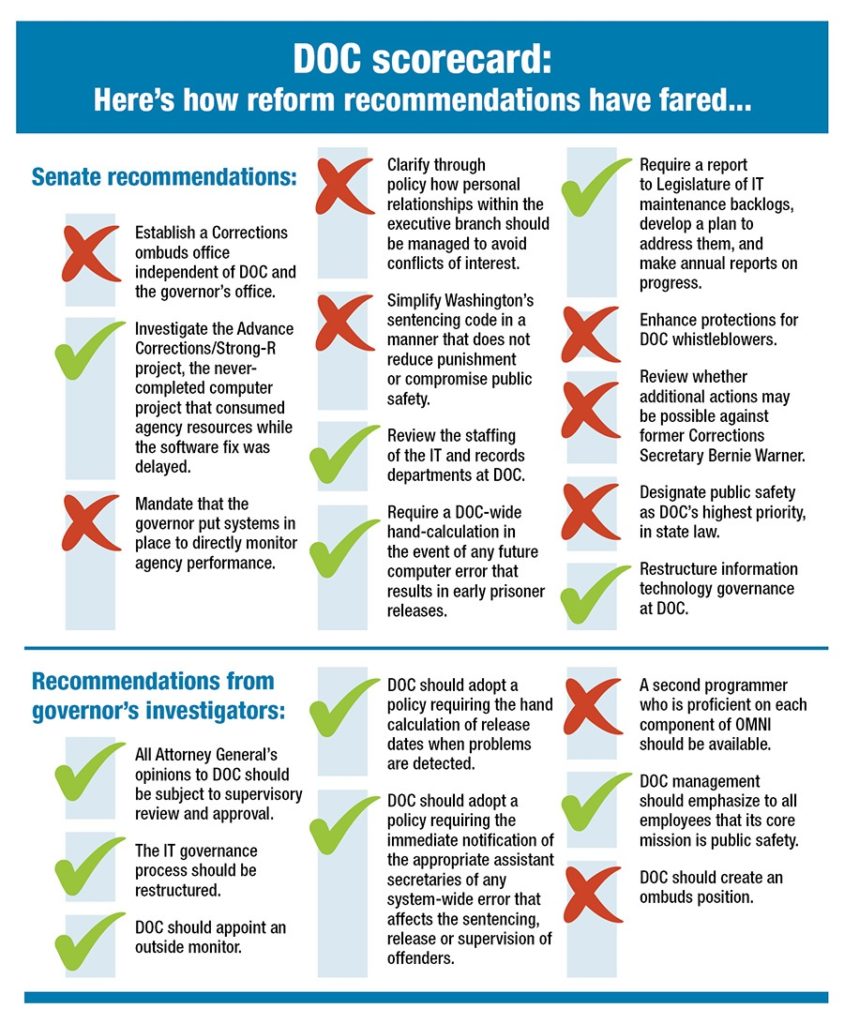The following newsletter was sent to subscribers to Sen. Padden’s Report From Olympia, July 24, 2017. To subscribe to Sen. Padden’s newsletters, click here.
Big tasks left undone as Legislature ends session
Dear friends and neighbors,
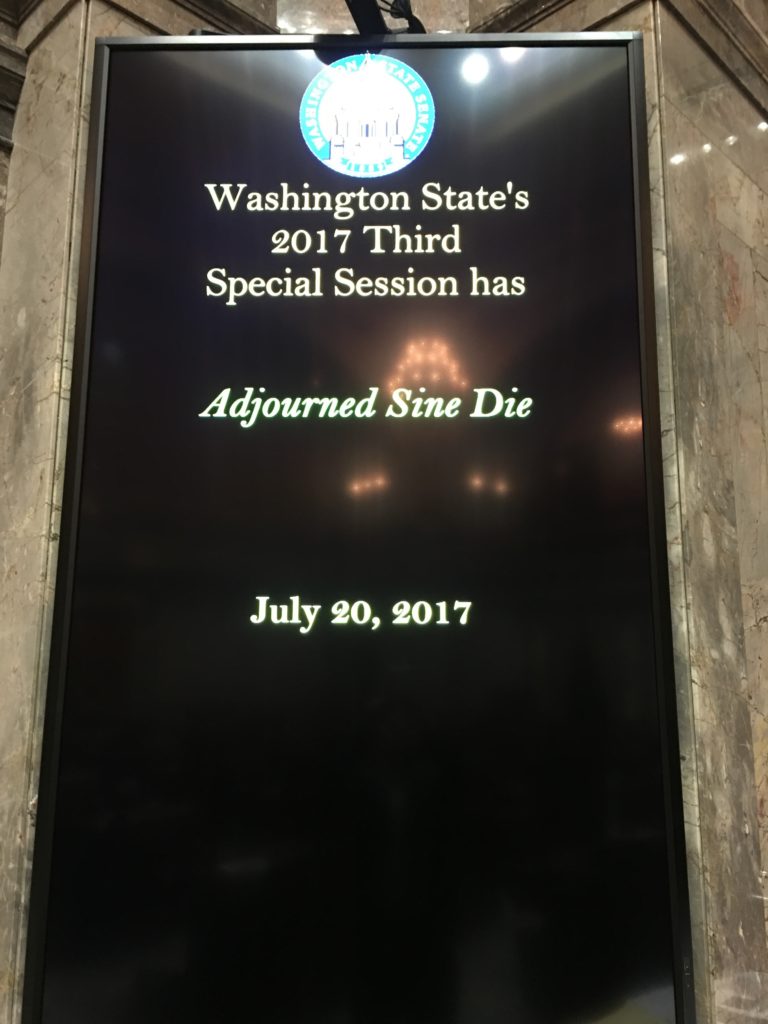 At long last, our 2017 legislative session has finally adjourned for the year. We scored major victories, but there were big disappointments, too. And we ended on a note of discouragement, as our colleagues in the House refused to take action on a water-rights measure that is crucial for anyone who cannot hook up to city water – killing the state’s public-works construction budget in the process.
At long last, our 2017 legislative session has finally adjourned for the year. We scored major victories, but there were big disappointments, too. And we ended on a note of discouragement, as our colleagues in the House refused to take action on a water-rights measure that is crucial for anyone who cannot hook up to city water – killing the state’s public-works construction budget in the process.
These important items of unfinished business will remain on the table, perhaps to be addressed in a short session later in the year, if our colleagues prove willing to compromise. Also blocked in the House were bills to reform the Department of Corrections and toughen penalties for property crimes – issues that will return in future sessions.This was the longest legislative session since the current schedule was adopted in 1980. It shouldn’t have taken us 195 days. The constitution gives us 105 days to finish the job in odd-numbered years, with the possibility of overtime. But this year our colleagues in the House felt little sense of urgency as they sought the biggest tax increase in Washington history, yet refused to bring these taxes to the floor of the House for a vote – because they almost certainly did not have the votes to pass them. The failure of the House to stake out a solid position made negotiations extremely difficult. This breakdown of the legislative process was really “the story behind the story” this year.
Our accomplishments this year include blocking proposals for massive tax increases, reforming the state’s school-financing system in a way that is fair to students and taxpayers, and passing significant legislation to strengthen our state’s driving-under-the-influence laws. I’ll tell you more about what happened in this week’s newsletter.
Sen. Mike Padden
House leaders duck vote on water-rights bill
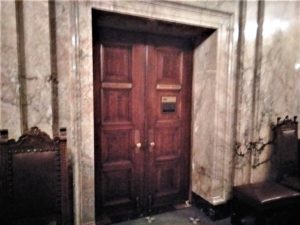
House leaders remained inside their caucus room on the final day of the 2017 Legislature, refusing to take their seats on the floor and blocking an effort by Republicans to pass a bill overturning the Supreme Court’s Hirst decision.
The final drama of this year’s session was the effort to overturn a recent state Supreme Court decision that makes it difficult, if not impossible, for property owners outside of cities to drill new household-sized wells. We passed a bill to fix the problem in the Senate, and as lawmakers gathered in Olympia Thursday for the last day of the session, our Republican colleagues in the House lined up enough votes to pass the measure. But they never got a chance to take a vote.
Democratic leaders held their members behind the closed doors of their caucus room. They never emerged to take their seats on the floor. At 7 p.m., they left the Capitol and went home, leaving only a handful of members to go through the formal adjournment motions. As Jim Brunner of the Seattle Times put it in a tweet, “This is the way #waleg ends – not with a bang but a scamper.”
Because our third overtime session of the year was constitutionally required to end at midnight, the clock simply ran out.
The failure to address the court’s misguided Hirst decision was one of the biggest disappointments of the year. It spells disaster for thousands of families who own property beyond the reach of municipal water systems. No water means no development, and we can expect property values to plummet. Those who are not directly affected will see their property taxes increase as taxes are shifted to those who remain standing.
The issue illustrates the sharp and growing divide between the Seattle area and the remainder of the state. House leaders come mainly from the urban Puget Sound region and do not hear the cries of anguish from rural and suburban property owners who are facing financial ruin. They are swayed by arguments from extreme environmentalists and powerful special-interest groups who maintain small wells pose a threat to fish runs, despite a lack of evidence to support their position.
We attempted to negotiate a compromise right up to the final hours of the session. House leaders weren’t willing to budge. They suggested a temporary reprieve, delaying implementation of the court ruling for up to two years, and they offered a vague promise to continue working on the issue. Not only would this be legally problematic, it also does nothing to prevent property values from tumbling. No bank will lend money to build a home on property where water is not available. We need a permanent solution, and we can be sure this issue will remain front and center when the Legislature meets again.
Public-works construction budget is unfinished business
Another indication of the divide between the urban Puget Sound region and the rest of the state is that we had to go to unusual lengths to get the attention of House leaders. Only when we insisted on a Hirst fix before we would consider a capital budget did they enter into negotiations. Because House leaders refused to pass a bill to solve the water problem, no capital budget was passed, either.
The failure to pass this $4 billion budget was as painful for us as it was for our colleagues from Seattle. This budget enjoys broad support in the Legislature — it pays for construction projects across the state, everything from water and sewer projects to public facilities and classrooms. There was a logical linkage between this construction budget and the well-water issue – some capital-budget money would have been used to implement the Hirst fix.
But more importantly, linking the capital budget to the water issue was the only way to cause our urban colleagues to take notice. As House Republican Leader Dan Kristiansen asked, “Is it fair for government to be able to build anything it wants, using taxpayer dollars, but the people who paid those taxes… can’t provide housing for their own families?”
The failure to pass the capital budget isn’t the end of the world – many projects currently under way will be able to continue for some months to come. But new projects will be delayed. This will help maintain pressure for a solution, perhaps before the Legislature reconvenes in January for our 2018 session. In the meantime, we are likely to see finger-pointing from urban areas as their projects are put on hold, but the situation is a reminder that the Legislature represents the entire state, and cannot ignore the issues of importance to its citizens.
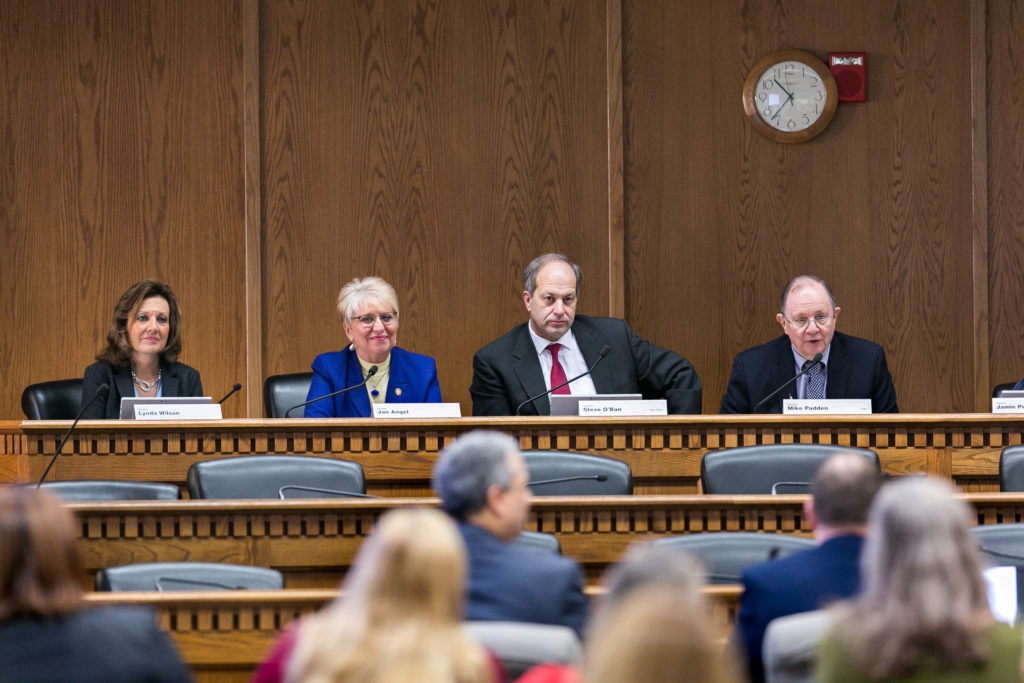
With members of the Senate Law and Justice Committee — Sens. Lynda Wilson, R-Vancouver, Jan Angel, R-Port Orchard, and vice chair Steve O’Ban, R-University Place.
Busy session for Law and Justice Committee
The Senate Law and Justice Committee, which I chair, was the busiest of all the Legislature’s policy committees this year. We passed 118 measures – bills, resolutions and gubernatorial appointments. None of us would argue that bill-production is the best measure of a committee’s performance, but the statistics demonstrate the central importance of the Law and Justice Committee to the legislative process, and that we were able to work with great efficiency.
We scored an important win this year as the Legislature passed a measure I sponsored making the 4th DUI a felony in this state, an effort that began in 2013. Other important public safety bills this year include measures that strengthen laws against retail theft, human trafficking and “flash mob” robberies.
Committee work sessions called attention to the crisis at The Evergreen State College, law enforcement response to a dangerous freeway protest in Bellingham, and ongoing problems at the Department of Corrections – just to name a few. We also are preparing to hold investigatory hearings into last year’s $54 billion bond issue campaign for Sound Transit, a major issue for the Puget Sound area, where motorists have been shocked by dramatic increases in car-tab fees.
But we were disappointed by the failure of the House to pass an important bill enacting reforms at the Department of Corrections, because of opposition from the governor. The bill was prompted by the early release of thousands of dangerous inmates, a tragic case of state-agency mismanagement. An exhaustive investigation into this tragic case by our committee last year revealed the need for major changes in the way DOC does business, yet many recommendations made in our report and by the governor’s own investigators have not been implemented. (See chart below.) Another bill strengthening laws against property crime, residential burglary and malicious motor vehicle offenses also did not pass. We can be sure debate will resume next year.
In the News – is Washington’s new family and medical leave bill ‘legislation through coercion?’
One of the disheartening compromises the Legislature made this year was passage of a new mandatory paid family-and-medical leave program. This new requirement will increase costs for employers and workers, and work against job creation in this state. Already I have introduced a bill for next session, SB 5983, which would allow workers to choose whether they wish to participate.
The state’s business community supported the new program out of fear labor interests would place an even-more-damaging initiative on the ballot. Polls have indicated it would likely pass. Yet many of us were dismayed by these coercive tactics and opposed this new government mandate on the Senate floor, noting that there was no chance for a ballot-measure campaign this year.
In an op-ed published in the Tri-City Herald, Erin Shannon of the Washington Policy Center points out that making the program voluntary would allow workers to decide for themselves whether they want their own money to be taken from their paychecks for this new government program. Shannon observes:
“While there are certainly differing opinions on mandating that employers and workers pay for a government benefit they may not want (at Washington Policy Center we believe employee benefits work best when they are voluntary, based on what workers want and what employers are willing to provide to attract the best talent), we should all agree the 11th-hour timing of how this new law was crafted and passed leaves much to be desired.
“Mandating a new benefit may make lawmakers feel generous, but it is workers and employers who pay the bill. Worse, they may be paying for a benefit they may never use and do not want. Of course, that is the inherent flaw of government mandates; they are based on force. At the very least, the state’s workers and employers deserve a better process to explore and debate the merits of such policies.”
A special shout-out of thanks
As this long session finally comes to an end, I want to express my appreciation to everyone on the legislative staff who worked so hard for the last six months. Let me single out for praise my legislative assistant, Janet Voye, who remains at work at our Spokane Valley office during the interim. Also making major contributions this year were session aide John “Jack” Grimm, who has taken a job as legislative assistant to Sen. Brad Hawkins, R-East Wenatchee, and session intern Irina Dolbinina, now working as intern to U.S. Rep. Jamie Herrera Beutler in Washington, D.C.
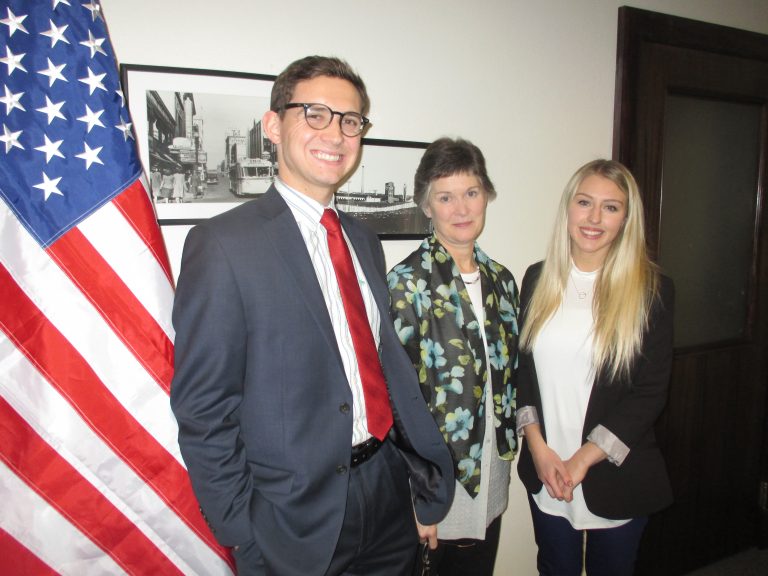
Office staff: Session aide John “Jack” Grimm, legislative assistant Janet Voye and session intern Irina Dolbinina.
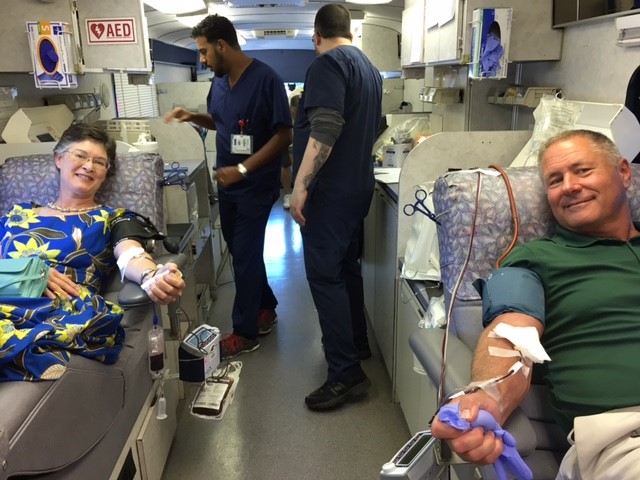
Legislative assistant Janet Voye, left, gives blood as the Inland Northwest Blood Center bloodmobile stops outside our offices at Spokane Valley City Hall.
Contact us
If you have a question or concern about state government, please do not hesitate to contact our office. We are here to serve you!
Phone: (509) 921-2460
Street address: 11707 East Sprague Ave., Suite 305, Spokane Valley, WA 99206
Email address: Mike.Padden@leg.wa.gov











